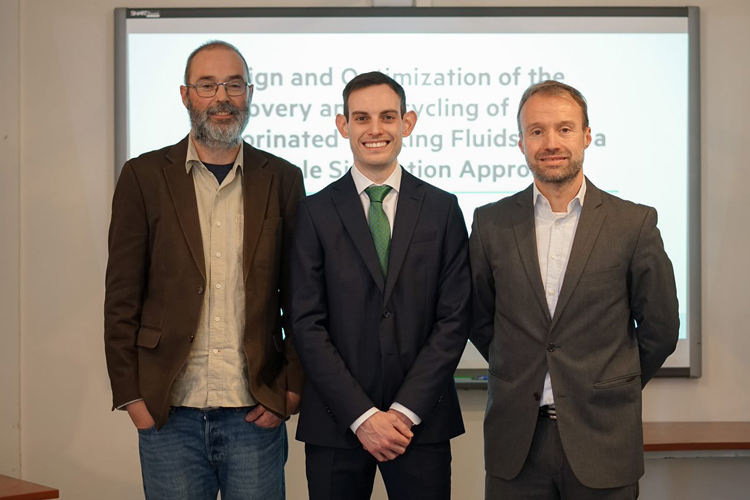Dr Daniel Jovell recently defended his doctoral thesis at IQS, focused on the design and optimization of fluorinated gas recycling and recovery systems through multi-scale simulation and combining various advanced thermodynamic instruments.

Dr. Rafael González, Dr. Daniel Jovell, Dr. Félix Llovell
Climate change is a real phenomenon caused by human activity and, most notoriously, by greenhouse gas emissions. Although CO₂ emissions account for two-thirds of global greenhouse gas emissions, other compounds – such as methane, nitrogen oxides, and fluorinated gases – also contribute to the increase.
The case of fluorinated gases (F-gases) is especially critical as they have a high global warming potential (GWP) at up to 12,400 times higher than CO₂. HCFs (hydrofluorocarbons) represent the majority of these emissions as they are widely used in both domestic and industrial refrigeration systems, without any well-developed technology to recover or reuse them at present. Therefore, they are sent for incineration when their life cycle ends. In 2016, an international agreement was signed in Kigali (Rwanda) to progressively replace them with other substances that have a lower GWP.
Dr Daniel Jovell Hidalgo's doctoral thesis forms part of this search for solutions to the recovery and use of HFCs. His thesis was jointly supervised by Dr Félix Llovell Ferret and Dr Rafael González Olmos and conducted and defended within the Department of Chemical Engineering and Materials Science at the IQS School of Engineering, entitled Design and Optimization of the Recovery and Recycling of Fluorinated Working Fluids Using a Multiscale Simulation Approach.
In a combined context of fundamental and applied research, the overall objective of the thesis focused on the development of circular economy initiatives as a result of the Kigali agreement. On the one hand, the thesis explored the design of models to separate and reuse F-gas mixtures with new alternative solvents, such as ionic liquids and deep eutectic solvents, using advanced thermodynamic instruments and using equations of state such as soft-SAFT (Statistical Association Fluid Theory), among others.
In addition, Dr Jovell used these tools to explore the substitution of HFCs that are currently employed with other more sustainable alternatives.
F-gas recovery and reuse
The recovery and reuse of F-gases is a promising strategy that extends their useful life while reducing the amount of new F-gases introduced to the market and their eventual release into the atmosphere, boosting the concept of the circular economy. To achieve this first objective, Dr Jovell carried out the design and simulation to recover refrigerant mixtures by absorption techniques in ionic liquids and deep eutectic solvents. Using combinations of multi-scale modelling tools, from molecular calculations to process simulations, he developed simplified models that maintain the basic thermo-physical information of the molecule and describe the solubility and resilience of HCFs in these solvents. In addition, the energy and environmental costs associated with the separation and recovery of HCF mixtures were estimated through these models.
Searching for alternatives to F-gases
In the second part of his research, Dr Jovell evaluated the use of alternative products to replace high-GWP F-gases such as hydrofluoroolefins (HFOs) and hydrofluoroethers (HFEs), two families of compounds considered to be the fourth generation of fluorinated refrigerants, and very promising for a wide range of applications.
The combination of computational tools and molecular simulations made it possible to gain knowledge both of the thermo-physical behaviour of the new candidates and their ability to replace current HCFs in specific applications, thus leading to new formulations with lower GWP.
The results of Dr Jovell's thesis therefore offer a variety of possibilities for action within the context of the climate emergency, and, above all, provide extensive knowledge about them in accordance with new legislation and contributing to the sustainability of the planet.
This doctoral thesis has been carried out thanks to various partnerships between the University of Barcelona (UB), Rovira i Virgili University (URV), the Nova University of Lisbon, the University of Concepción (UdeC) in Chile, and the University of Talca (UTalca), also in Chile.
Related publications
Asensio-Delgado, S., Jovell, D., Zarca, G., Urtiaga, A., & Llovell, F. (2020). Thermodynamic and process modeling of the recovery of R410A compounds with ionic liquids, International Journal of Refrigeration, 118, 365–375.
Jovell, D., B. Gómez, S., Zakrzewska, M. E., Nunes, A. V., Araújo, J. M., Pereiro, A. B., & Llovell, F. (2020). Insight on the solubility of R134a in fluorinated ionic liquids and deep eutectic solvents, Journal of Chemical & Engineering Data, 65(10), 4956–4969.
Jovell, D., O. Pou, J., Llovell, F., & Gonzalez-Olmos, R. (2022). Life Cycle Assessment of the Separation and Recycling of Fluorinated Gases Using Ionic Liquids in a Circular Economy Framework, ACS Sustainable Chemistry & Engineering, 10(1), 71–80.
Jovell D., Gonzalez-Olmos R., & Llovell F. (2022). A computational drop-in assess-ment of hydrofluoroethers in Organic Rankine Cycles, Energy, 254, 124319.
This thesis has received funding from the KET4F-Gas project (SOE2/P1/P083), co-financed by the European Regional Development Fund, within the framework of the Interreg SUDOE programme, and from the STOP-F-GAS project (PID2019-108014RB-C21), funded within the State R&D&i Programme aimed at the Challenges of Society under the National Plan of the Ministry of Science and Innovation – State Research Agency.











